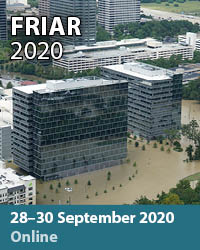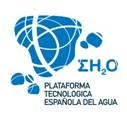FRIAR 2020
7th International Conference on Flood and Urban Water Management
![]()
28–30 September 2020
Online
Overview

With the main objective to preserve our delegates’ wellbeing, but also with the belief that the scientific community should not be stopped, WIT decided that FRIAR 2020 should not take place as scheduled, in Valencia, Spain, but take place as an online event instead.
The conference was organised by the Wessex Institute, UK, and the Polytechnic University of Milan, Italy represented by Professor Stefano Mambretti, Member of the WIT Board of Directors and the Birmingham City University, represented by Professor David Proverbs.
The conference, which started in London, UK in 2008 is well-established and always attracts a wide international spread of delegates.
The 7th meeting took place at a time when the challenges of flooding are continuing to escalate across the world. For example, recent flooding across Africa affecting countries including Sudan, Senegal and Niger has caused hundreds of fatalities and impacted copious communities.
In the UK earlier this year and just prior to the COVID-19 period of lockdown, three storms predicated major flooding across England, Scotland and Wales.
Flood risk management research continues to advance our understanding, drawing on expertise from a wide range of disciplines.
The increase in global flooding is a consequence of a variety of complex and integrated factors, including climate change.
The series of conferences has demonstrated the widespread nature of flood hazards and has contributed to the evolving understanding of the science and policy contexts of flood risk management and has acknowledged that flooding remains the most damaging natural hazard globally.
Opening of the Conference
The conference was opened with a presentation of the Wessex Institute followed by a welcome address by Chairman Professor David Proverbs, who explained the purpose and great benefits of this year’s online event.
Invited Presentations
There were a series of invited lectures on advanced topics of research and applications, as follows:
- “Pumped-hydro storage systems and flood risk mitigation: a proposed nexus”, by David Proverbs, of Birmingham City University, UK.
- “The water nexus in Southwestern Idaho, USA: development versus agriculture”, by Robert Mahler, of the University of Idaho, USA.
- “Flood environmental impact risk assessment”, by Martina Zelenakova, of the Technical University of Kosice, Slovakia
- “Keeping everyone on the same page during flash flood emergencies”, by Baxter Vieux, of Vieux & Associates, Inc., USA
- “Determining the impacts of wildfires on peak flood flows in high mountain watersheds”, by Michael Barber, of the University of Utah, USA
- “Infiltration-exfiltration systems design under hydrological uncertainty”, by Gianfranco Becciu, of the Polytechnic University of Milan, Italy
- “Using an ecosystems lens to explore a broader funding base for laneways”, by Jessica Lamond, of the University of the West of England, UK
- “Performances and uncertainty of temperature methods for illicit infiltrations and inflows assessment in stormwater sewers”, by Mariana Marchioni, of the Polytechnic University of Milan, Italy.
Conference Sessions
The papers presented during the conference were classified under the following headings:
- Flood risk management
- Flood warning and forecasting
- Flood modelling
- Flood damage assessment
- Blue-green infrastructure
- Urban drainage systems
Conference Publication
Papers presented at this conference are published in Vol. 194 of the WIT Transactions on the Built Environment (ISSN 1743-3509). Papers presented at the meeting are available Open Access in the eLibrary of the Wessex Institute (https://www.witpress.com/elibrary) from where they can be freely downloaded by any interested parties.
A few papers were selected for publication in the International Journal of Environmental Impacts. This Journal covers the subjects on the numerous environmental problems present in modern society and their impacts, taking into account scientific, economic and social issues.
Closing of the Conference
We are very sorry that we were not able to meet our delegates in person this year.
WIT is aware that one of the benefits of the conferences is the networking among colleagues and the only reason for implementing this strategy is the exceptional circumstances created by the covid-19 crisis. Thus, to allow the authors to maintain that capability, delegates who registered for this conference, and had their paper accepted for publication, are able to attend the next conference in the series (or a different conference of their choice devoted to similar topics that takes place prior to that) free of charge, and if they wish, make an oral presentation of their published paper.
We would like to thank the delegates for participating in the event and look forward to meeting them at the next conference in the series.
Related Conferences
Sustainable Water Resources Management 2021, 18–20 May 2021
Water and Society 2021, 19–21 May 2021
Sustainable City 2021, 5–7 October 2021




 Wessex Institute
Wessex Institute